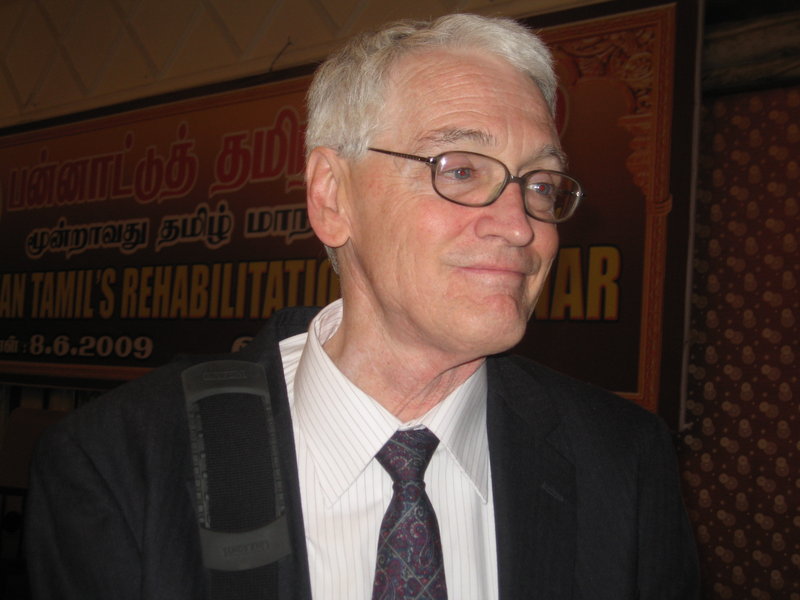A Great Progressive International Law Scholar and Practitioner
by Prof. Richard Falk in his blog, February 6, 2025
[Prefatory Note: The following post represents my reflections on the outstanding progressive international law expert of our time, and takes notes of both pardonable faults and eternal gratitude for a courageous life well spent.
Francis Boyle: In Memoriam; RIP
It is with sadness that I take note of the sudden unexpected death of one of the few consistently progressive international Law scholars in the academic ranks of the US on January 30, 2025 at the age of 74. Boyle was active until he was pronounced dead due to undisclosed causes.

Francis Boyle. Image courtesy TamilNet
Despite being born in Chicago Boyle maintained his primary national identity was Irish. Francis was fond of asserting that he was ‘born Irish,’ and not as a white North American. Throughout his productive life Francis associated himself with many neglected struggles for justice, with especial attention given to opposing the Israel’s treatment of the Palestinian people, which he termed genocidal as early as 2009. He acted as a legal advisor to the Palestinian Authority and to the Palestinian negotiating team. He also acted as counsel representing several tribal communities seeking to redeem their legal rights as indigenous peoples and several other causes involving vulnerable or abused communities.
Among those deserving praise for their courage in speaking truth to power, no
one among international law experts since the end of World War II, so exemplified this crucial virtue of engaged and progressive citizenship than Francis Boyle. He spoke bluntly, and often insultingly, about those who invoked international law to rationalize the foreign policy of the US Government. His published writing was informed by a deep knowledge of his varied subjects, always expressing himself lucidly and uncompromisingly, most energetically when condemning US and Israeli lawlessness. His views were set forth in a self-confident style and his interpretations of law invariably placed him on what progressive persons agree is the right side of history. In keeping with this posture of radical dissent, Boyle’s heroes were unsurprisingly academicians and public figures who shared his outlook and public engagement, most notably Noam Chomsky and Ramsey Clark, and the less well known, the respected Harvard Law professor, Clyde Ferguson. Francis had an elite education, that included earning a magna cum laude degree from Harvar Law School. Nevertheless, Francis never attained the front ranks of those recognized as public intellectuals as were Edward Said, Howard Zinn, Daniel Ellsberg, and Susan Sontag.
Richard Falk
As is often the case with radical dissenters, unless first tier scholars, they pay a price for their civic integrity and engagement, and there is little doubt in my mind, that Francis was informally blacklisted in many prestigious centrist venues, including the American Society of International Law and the Council of Foreign Relations. He clearly merited election to the Board of Editors of the American Journal of International Law on the basis of his scholarly stature, but it never happened during his 41 years as a faculty member of the College of Law at the University of Illinois. His many books on controversial issues were rarely reviewed in mainstream journals or appeared on the syllabi or recommended reading lists of international law courses. Despite being spurned at home, Francis was well known internationally as a skilled lawyer who would provide his services to causes unpopular or unknown in the West.
Francis managed to do many bold and valuable things in his own way over the years. He believed in using juridical frameworks to expose the wrongdoing of the powerful with an awareness that winning in court made the claim legitimate, but did not assure enforcement, which he correctly understood to be a political rather than a legal project.
Francis supported in courts of law claims of justifiable civil disobedience by young Americans during the Vietnam War, served as a lead prosecutor for a high profile Malaysian civil society tribunal condemning the role of the US in the Iraq War, he advised Palestinian negotiators seeking a just peace with Israel, provided services as a lawyer on behalf of indigenous rights, and represented Bosnia and Herzegovina in the International Court of Justice in their legal action against Serbia, charging genocide.
Yet not all that glitters is gold. Francis was stubborn and dogmatic, unyielding in articulating his controversial views, and had an annoying habit of invariably proclaiming his own importance that diverted attention from the substantive issues to be addressed. I believe Francis brought on some of the unfair blacklisting in academic circles by a kind of obsessive and unabashed narcissism that diverted attention from his great talents as jurist and lawyer with an unwavering commitment domestically and internationally to the rule of law as a source of justice and core element of a genuine democracy, which helps his affinities with the powerless and vulnerable.
In the end, we should celebrate the achievements and ethical heroism of Francis Boyle, and forgive those all-too-human shortcomings when it comes to matters of humility. Too few of us who profess progressive have the courage of our convictions that put our ideas and beliefs in the public square. Maybe we should express gratitude to the Irish genes, which seems to have guided Francis Boyle to be the foremost progressive international law specialist of our time. Unfortunately, he has left us when we need his thought and action as never before in the history of this republic that had at least revered the Constitution even as it broke its own laws and supposed value from the moment is broke from the British Empire but not from imperialism, and even slavery for Africans and genocidal policies toward native Americans. We who benefited from Francis’s presence bemoan his absence.